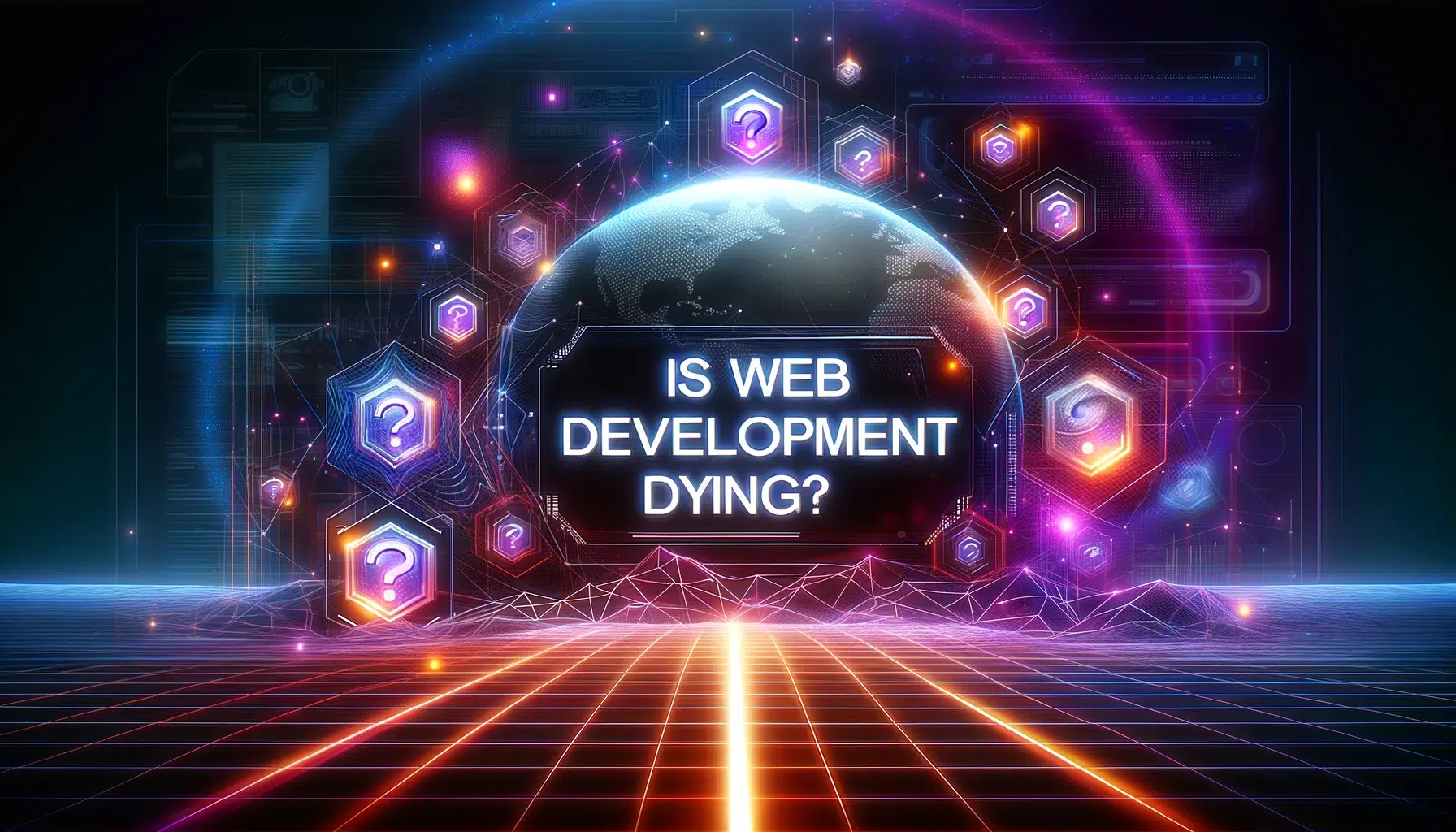Is Web Development Dying? Separating Fact from Fiction
As a web developer, you might have encountered concerning rumors about the future of your field. There’s talk that web development is dying, threatened by advancements like artificial intelligence, low-code platforms, and other emerging technologies. But how much truth is there to these assertions? Are they merely misconceptions and hyperbole?
This article delves into the pressing question: Is web development dying? We’re going to sift through the realities and misconceptions surrounding this claim, focusing on how to navigate the evolving web landscape. By the conclusion of this article, you’ll have a clear understanding of the current state of web development, the essential skills for a successful web developer, and the best practices to implement in 2024 and the years that follow.
Is Web Development Dying? The Facts and the Myths

To tackle the question, “Is web development dying?”, we must first delineate what constitutes web development. It’s a process that includes the creation, design, and maintenance of websites and web applications, bifurcated into front-end development—utilizing HTML, CSS, and JavaScript for the visual and interactive aspects—and back-end development, which involves server-side logic and data management using technologies like PHP, Python, and SQL.
This field is neither static nor monolithic; it’s in a state of perpetual evolution, driven by the advent of new technologies, frameworks, and standards, as well as the shifting needs and preferences of users and the market. Far from waning, web development is undergoing a significant metamorphosis, adeptly adapting to the ever-changing digital landscape.
The Facts: Web Development is Still in High Demand
The notion that web development is fading is contradicted by the sustained demand for web developers in the job market. Let’s delve into some compelling statistics that highlight the robust state of web development:
- The U.S. Bureau of Labor Statistics reveals an anticipated growth of 8% in web development jobs from 2019 to 2029, a rate considerably outpacing the average across all professions¹. This surge is attributed to the growing reliance on digital platforms such as e-commerce, online gaming, and social media.
- Furthermore, Glassdoor reports an average annual salary of $76,929 for U.S. web developers², a figure subject to variation based on factors like location, experience, and skill set. Beyond their regular income, web developers often boost their earnings through freelancing, consulting, teaching, or developing their own digital products.
The Myths: Web Development is Becoming Obsolete or Irrelevant
Web development remains a thriving field, adapting to the integration of advanced technologies like AI and low-code platforms. Far from replacing developers, these innovations enhance their skillset:
- AI’s Role in Web Development: AI emerges as a supportive tool, aiding developers in coding, testing, debugging, and customizing websites. It elevates the developer’s creative process, enabling the creation of unique web features such as chatbots and interactive elements.
- The Impact of Low-code Platforms: Ideal for novices and non-tech savvy individuals, low-code platforms simplify website creation with minimal coding. They’re not a substitute for professional development, as they lack the depth in customization and handling complex tasks, but they provide an accessible option for basic needs.
- Adapting to New Technologies: Ongoing advancements in mobile development, cloud computing, and blockchain present both challenges and opportunities. Web developers are encouraged to stay informed and proficient in these evolving technologies to maintain their edge in the field.
How to Succeed as a Web Developer in 2024 and Beyond

Web development is not dying, but it is changing. Web developers need to adapt to the new challenges and opportunities that the web offers, and constantly learn new skills, tools, and trends to stay ahead of the curve. Here are some of the skills, tools, and trends that web developers need to master in 2024 and beyond.
The Skills You Need to Master as a Web Developer
In the dynamic world of web development, a wide array of skills is paramount, encompassing both technical prowess and interpersonal aptitudes:
1. Core Languages for Web Development
Proficiency in HTML, CSS, and JavaScript is not just beneficial, but essential. These languages form the fundamental triad for creating, styling, and adding functionality to websites and applications.
2. Responsive Web Design Expertise
In today’s mobile-centric world, developing websites that adapt seamlessly to various devices using methodologies like media queries and responsive frameworks is indispensable.
3. Front-End Frameworks Knowledge
Familiarity with frameworks such as React, Angular, and Vue is crucial. These frameworks provide a structured approach to web development, offering pre-coded components and templates.
4. Back-End Development Skills
Command over server-side languages and frameworks, including Node.js, Python, Ruby, and PHP, is crucial for the development of dynamic, scalable web applications.
5. Database Management Competence
Effective management of databases, both SQL and NoSQL types, is central to the functionality of web applications, particularly for data-driven features.
6. API and RESTful Services Integration
Proficiency in the integration and utilization of APIs facilitates the interaction of web applications with diverse external services and data sources.
7. Web Security Acumen
A comprehensive understanding of web security is essential, particularly to combat prevalent threats such as SQL injection and cross-site scripting.
8. Performance Optimization Techniques
Employing strategies to enhance site speed and efficiency is paramount, utilizing tools like Lighthouse and Webpack to optimize user experience.
9. Web Accessibility and Inclusion Standards
Adherence to web accessibility standards, such as WCAG, is a critical aspect of web development, ensuring that websites are accessible to all users.
10. Soft Skills
Beyond technical skills, the ability to communicate effectively, collaborate with others, and solve problems creatively are essential qualities for managing web development projects successfully and achieving optimal outcomes.
The Tools You Need to Use as a Web Developer

In the intricate world of web development, a variety of specialized tools are indispensable:
- Code Editors and IDEs: These applications are crucial for writing, editing, and debugging website code. They offer features like syntax highlighting and code completion. Popular choices include Visual Studio Code and Atom.
- Version Control and Collaboration Tools: Tools such as Git and GitHub are vital for managing code changes and facilitating collaboration among developers.
- Web Browsers and Development Tools: Applications like Chrome and Firefox, along with their developer tools, are essential for testing and debugging in varied environments.
- Web Hosting and Deployment Services: Platforms like AWS and Netlify play a key role in making websites accessible and scalable on the internet.
The Trends You Need to Follow as a Web Developer
In the ever-evolving field of web development, staying updated with industry trends is crucial. Here are some pivotal trends:
- Progressive Web Apps (PWAs) are key. They merge web and mobile app features, offering offline access and rapid loading, thereby enhancing user engagement and expanding your audience.
- Single-Page Applications (SPAs) are revolutionizing the way websites interact with users. By dynamically updating content without page reloads, they elevate responsiveness and user satisfaction.
- The adoption of Serverless Architecture marks a significant shift. By executing code in the cloud, it liberates developers from server management, leading to increased scalability, cost-effectiveness, and security.
- Embracing Jamstack, which employs JavaScript, APIs, and Markup, results in faster, more secure, and easily maintainable web solutions, leveraging the full potential of modern web technologies.
Conclusion
In conclusion, the answer to the question, ‘Is web development dying?’ is that web development is not dying; rather, it is evolving. Web developers need to adapt to the new challenges and opportunities that the web offers, and constantly learn new skills, tools, and trends to stay ahead of the curve. Web development is a rewarding and exciting career, and it will continue to be so in 2024 and beyond.
For those in search of a professional and dependable web development company, OnextDigital stands out as a prime choice. We are at the forefront of web development, offering a comprehensive array of web developmet services, including:
- Custom web development
- E-commerce web development
- WordPress web development
- Web design and UI/UX
- Web maintenance and support
Our team at OnextDigital comprises seasoned and talented web developers, capable of managing diverse web development projects. We’re committed to helping you realize your web development objectives, delivering websites and web applications that are not only rapid and secure but also provide an exceptional user experience.




